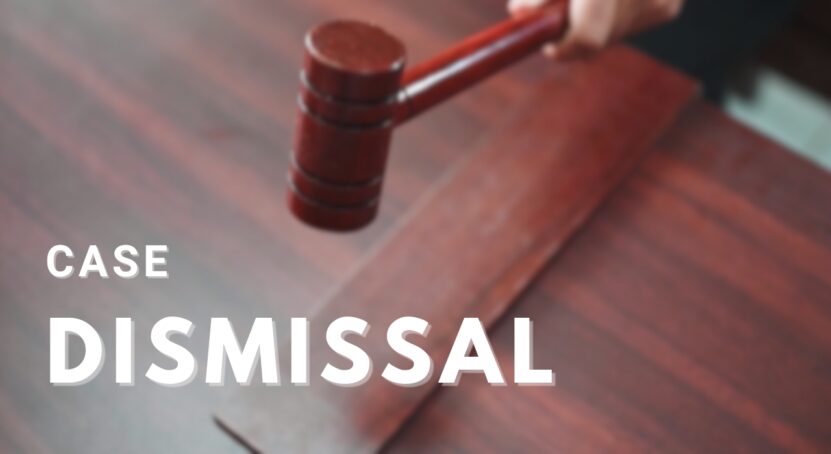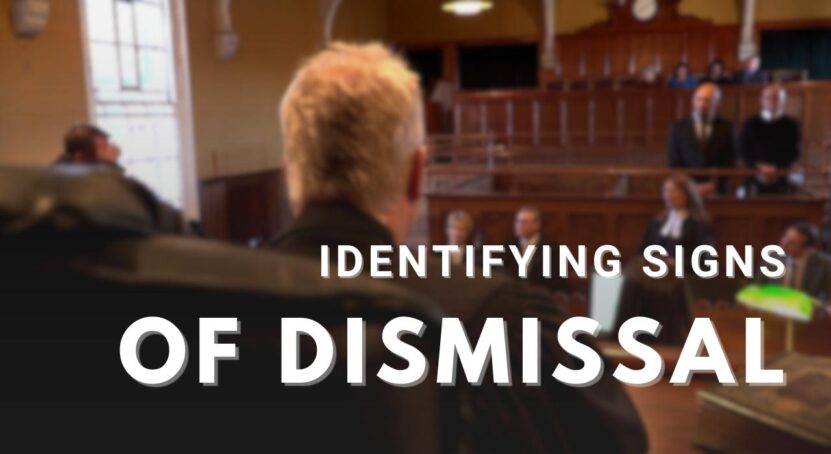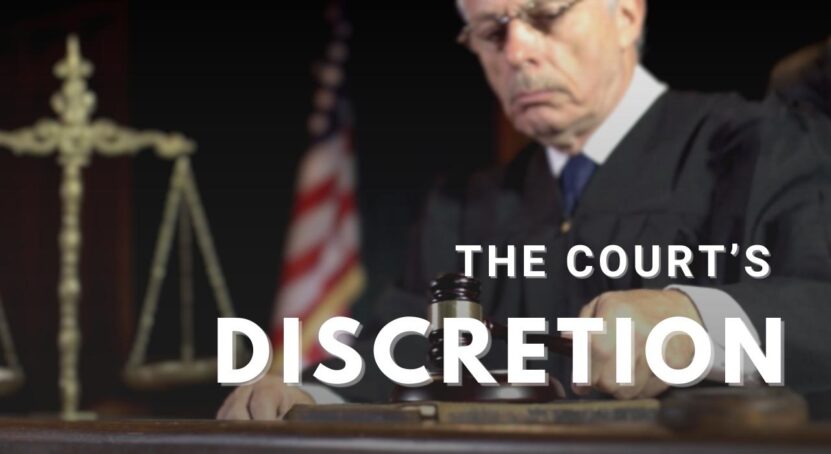The legal world is like a vast maze for the uninitiated. It can be complex, filled with winding paths and blind turns, and it can often feel like you’re navigating it alone. One crucial aspect to be aware of is the possibility of your case being dismissed. As a retired judge, I’ve seen countless cases dismissed for a variety of reasons. In this blog post, we will dissect the signs that indicate your case may be heading toward dismissal.
Case Dismissal Explained

Before diving into the signs, let’s get a clear understanding of case dismissal and its implications.
The Concept of Case Dismissal
A case dismissal is the court’s way of deeming a case unworthy of further judicial time and resources.
- Lack of Jurisdiction: If a court does not have the legal authority to hear a particular case, it will be dismissed.
- Failure to Prosecute: If the plaintiff fails to push the case forward, a court may dismiss it.
- Insufficient Evidence: Without enough evidence to support the claim, a court may dismiss the case.
Types of Dismissals
There are two primary types of dismissals: with prejudice and without prejudice.
- Dismissal With Prejudice: This means the case is dismissed permanently, and the plaintiff is barred from bringing an action on the same claim.
- Dismissal Without Prejudice: The plaintiff is allowed to refile the case if he or she chooses.
The Effect of a Dismissal
A dismissal can have various effects, depending on the nature of the dismissal.
- On Record: A dismissal goes on record and can influence the outcome of future litigation.
- Impact on Plaintiff: It can be emotionally and financially draining for the plaintiff.
Steps After Dismissal
If your case has been dismissed, there are certain steps you need to take.
- Understanding the Reason: Understand why your case was dismissed to prevent the same mistake in the future.
- Appeal or Refile: Depending on the type of dismissal, you may be able to appeal or refile your case.
Identifying Signs of Dismissal

Now that we understand what a case dismissal is, let’s explore signs that your case may be heading toward this outcome.
Lack of Evidence
The first and most common sign is the lack of evidence. Courts require strong, clear, and compelling evidence to move forward with a case.
- Insufficient Proof: If your evidence doesn’t support your claim, or if you lack crucial evidence, your case stands a high chance of being dismissed.
- Inadmissible Evidence: Evidence obtained illegally or in violation of certain rules is inadmissible and can’t support your case.
Procedural Errors
Procedural errors are another common cause for case dismissals. Courts are strict about following proper procedures, and any violation can lead to dismissal.
- Incorrect Filing: Incorrect or incomplete filing of documents can result in a dismissal.
- Improper Service: If the defendant was not properly served with a notice, your case could be dismissed.
Lack of Jurisdiction
If a court lacks jurisdiction, either geographically or subjectively, it can’t legally hear your case.
- Geographic Jurisdiction: If a case is filed in the wrong geographical location, it can be dismissed.
- Subject Matter Jurisdiction: If a court lacks authority over the type of case presented, it will be dismissed.
Failure to Prosecute
If the plaintiff fails to push the case forward or doesn’t appear in court, the case may be dismissed due to a failure to prosecute.
- No Progress: If the plaintiff does nothing to move the case along, the court can dismiss it.
- No Show: If the plaintiff or their attorney doesn’t show up to court hearings, the case can be dismissed.
The Role of Your Attorney

A competent and reliable attorney plays a pivotal role in preventing case dismissal. Here’s how:
Lack of Legal Grounding
Your case could be dismissed if it lacks a sound legal basis. An experienced attorney can help ensure your case is legally solid.
- Weak Claims: Your claim must have a strong legal basis. If it lacks merit, the court may dismiss it.
- Legal Misinterpretation: If you or your attorney misinterpret the law about your case, it could be grounds for dismissal.
Ineffective Representation
Ineffective representation by your attorney can lead to case dismissal.
- Inexperience: An inexperienced or under-prepared attorney might fail to provide competent representation, which could lead to dismissal.
- Conflict of Interest: If your attorney has a conflict of interest, it could impact your case negatively, possibly leading to dismissal.
Communication Breakdown
A breakdown in communication between you and your attorney can also lead to case dismissal.
- Unresponsiveness: If your attorney does not respond to court notices or your queries, it can lead to problems with your case.
- Miscommunication: Miscommunication about case details between you and your attorney can lead to mistakes in case representation.
Ethical Violations
Attorneys are required to follow certain ethical standards. Violations of these can lead to case dismissal.
- Breach of Confidentiality: If your attorney discloses confidential information without your consent, it could harm your case.
- Fraudulent Practices: If your attorney uses fraudulent practices, like tampering with evidence or witnesses, it could lead to dismissal.
The Court’s Discretion

The court has a broad discretionary power to dismiss a case for a variety of reasons.
Failure to Comply with Court Orders
Failure to comply with court orders can result in dismissal.
- Disobeying Orders: If you or your attorney disobeys court orders, the court may dismiss your case.
- Contempt of Court: Behaving disrespectfully in court can be grounds for dismissal.
Failure to Disclose Facts
All facts relevant to your case must be disclosed. Failure to do so can result in dismissal.
- Hiding Facts: If you knowingly hide facts that are relevant to your case, the court may dismiss it.
- Misrepresentation: If you misrepresent facts, the court can dismiss your case.
Malicious Prosecution
If the court believes that your case has been filed to harass or harm the defendant, it can be dismissed.
- Unfounded Claims: Filing cases based on unfounded claims can be considered malicious.
- Vexatious Litigation: If you’re known to file multiple unnecessary lawsuits, the court may dismiss your case.
Fraud upon the Court
Engaging in fraudulent activities to mislead the court can lead to dismissal.
- Tampering with Evidence: Altering or fabricating evidence can result in your case being dismissed.
- Witness Tampering: If you or your attorney is found influencing witnesses dishonestly, the court may dismiss your case.
Impact of Public Behavior and Social Media

In today’s digital age, your public behavior and social media activities can influence the outcome of your case.
Public Behavior
Your behavior in public could play a role in the dismissal of your case.
- Inconsistent Behavior: If your public behavior contradicts your claim, it can lead to dismissal. For example, if you claim injury but are seen doing heavy lifting, it can hurt your case.
- Illegal Activities: If you’re involved in illegal activities, it may weaken your credibility and cause your case to be dismissed.
Social Media Activities
Social media can have a significant impact on the outcome of your case.
- Contradictory Posts: If your social media posts contradict your claims, it could lead to your case being dismissed.
- Public Remarks: Negative or disrespectful remarks about the judge, jury, or opposition can harm your case.
Media Interference
The media can sway public opinion and potentially affect your case.
- Media Trials: Public discussion of ongoing cases can sway public opinion and potentially influence court proceedings.
- Defamation: If you’re involved in defaming the opposing party or key players in your case, it can lead to case dismissal.
Leaking Confidential Information
Confidentiality is vital in legal proceedings. Leaking information can lead to case dismissal.
- Public Disclosure: Disclosing confidential information about your case publicly can lead to dismissal.
- Breaching Confidentiality Agreements: If your case involves a confidentiality agreement and you breach it, your case may be dismissed.
Timing and Statute of Limitations

Timing is a critical aspect of legal cases. The statute of limitations and other timing-related aspects could lead to case dismissal.
Statute of Limitations
Every legal case has a statute of limitations, which is the time within which a case must be filed.
- Exceeding the Limit: If you file your case after the statute of limitations has expired, your case will likely be dismissed.
- Ignorance of the Law: Not being aware of the statute of limitations is not a valid excuse and could still lead to dismissal.
Late Filing of Documents
Timely filing of documents is crucial in a legal case.
- Delay in Filing: If you or your attorney file necessary documents late, it could lead to your case being dismissed.
- Missing Deadlines: Missing any other court-imposed deadlines could also result in dismissal.
Delay in Serving the Defendant
The defendant must be served promptly after the case is filed.
- Delay in Service: If there’s a delay in serving the defendant without a valid reason, your case may be dismissed.
- Improper Service: If the defendant isn’t properly served, your case can be dismissed.
Lack of Speedy Trial
If your case isn’t tried within a reasonable time, it may be dismissed.
- Unreasonable Delays: If there are significant delays without a valid reason, your case may be dismissed.
- Violation of Right to Speedy Trial: In criminal cases, if the right to a speedy trial is violated, it can result in dismissal.
In the realm of criminal cases, understanding the nuances of the good faith exception becomes paramount as it can significantly impact the outcome of legal proceedings, serving as a potential red flag that could lead to the dismissal of a case.
Final Words

Knowing the signs of a potential case dismissal is just the beginning. It’s about understanding the terrain of the legal battlefield, learning the rules of engagement, and always being prepared for what lies ahead. This knowledge is your first line of defense and the cornerstone of a strong case. Armed with this information, you are better equipped to navigate the complex world of law.
When navigating the legal system, it is crucial to be aware of potential red flags that could jeopardize the outcome of your case, including the presence of a bench warrant, an issue that often remains concealed from public view.

